5 Symptoms of a Bad CV Joint (and Replacement Cost)
Notice strange noises and vibrations while driving ? Do you feel like something is off, but you can’t quite put your finger on it? The culprit could be a bad CV joint.
CV joints last a long time, but not forever. Keep reading to learn how to spot the signs of a bad CV joint, what causes failure, and how much it will cost to fix.
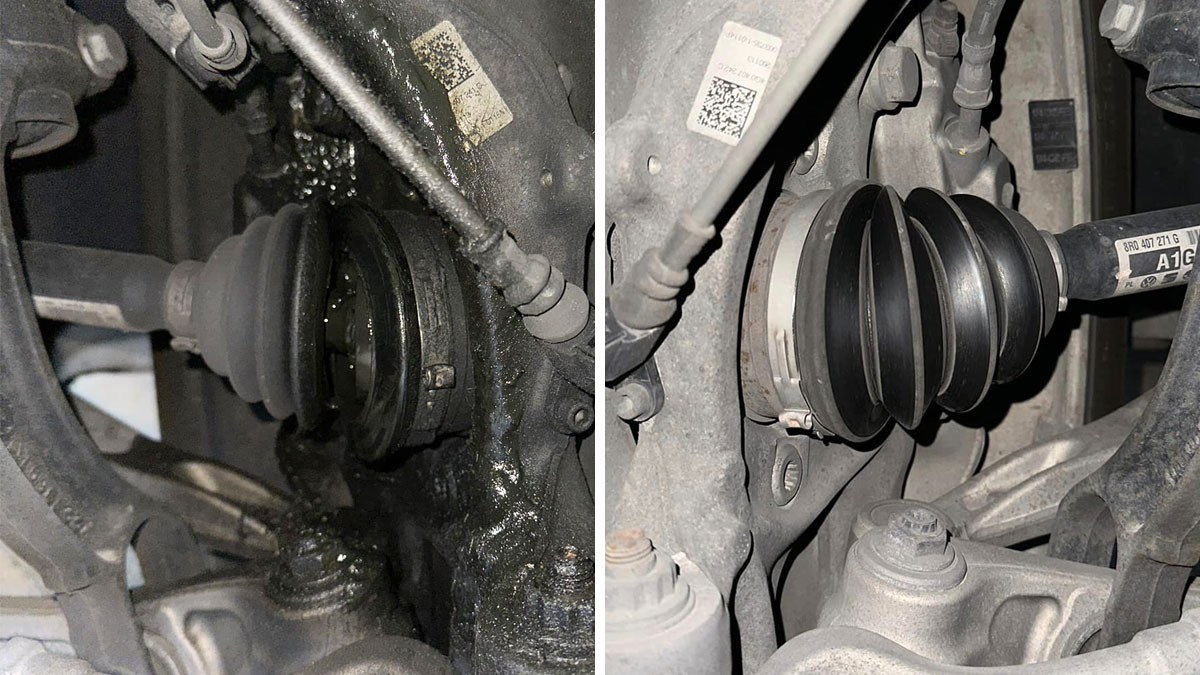
Related: 4 Symptoms of a Bad CV Axle
What Is a CV Joint?
A CV joint, or constant velocity joint, is an important part of your vehicle’s drivetrain. It allows the transmission of power from the engine to the wheels while accommodating the up-and-down movement of your car’s suspension system. In simpler terms, it helps your car drive smoothly even when the road surface isn’t perfect.
As your vehicle navigates varying terrain, the CV joint adapts to keep the power transmission consistent and smooth. These joints are typically found in the CV axle, which connects your vehicle’s transmission to the wheel hubs.
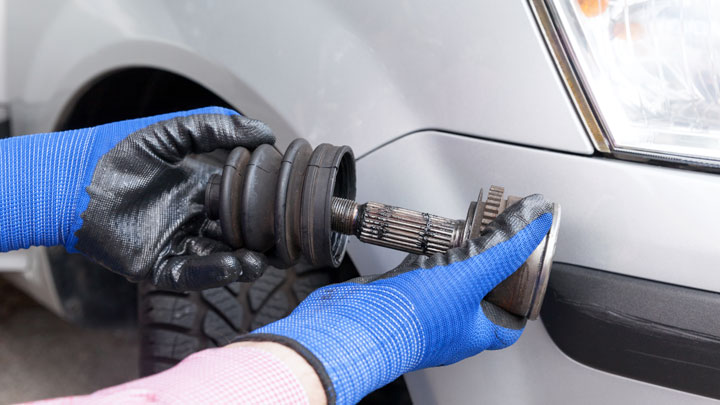
Front-wheel drive and all-wheel drive vehicles rely on CV joints to function properly. As for rear-wheel drive vehicles that have separate rear suspensions, the half-shafts’ ends of the rear axle will have CV joints in them.
There are two types of CV joints: inner and outer. The inner joint connects the CV axle to the transmission, while the outer joint connects the CV axle to the wheel hub. Both joints are enclosed in a protective rubber boot (aka: CV gaiter), which maintains lubrication inside the joint and keeps dirt and debris out.
Bad CV Joint Symptoms
There are certain warning signs to look out for when it comes to CV joint failure. Below are the 5 most common symptoms of a bad CV joint:
#1 – Tire Edge Grease
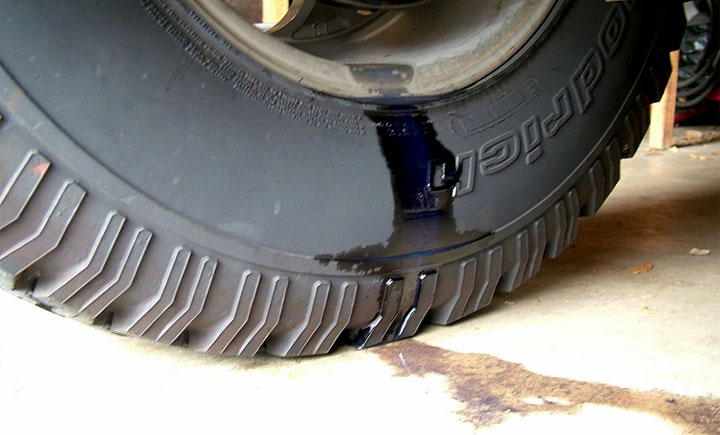
When you spot grease along the edge of your tire, particular from a tear or tiny crack, it could be a sign you could have a bad CV joint. A significantly damaged CV joint means darker colored grease might be visible on the rim and wheel’s interior.
#2 – Turning Causes Loud Noises
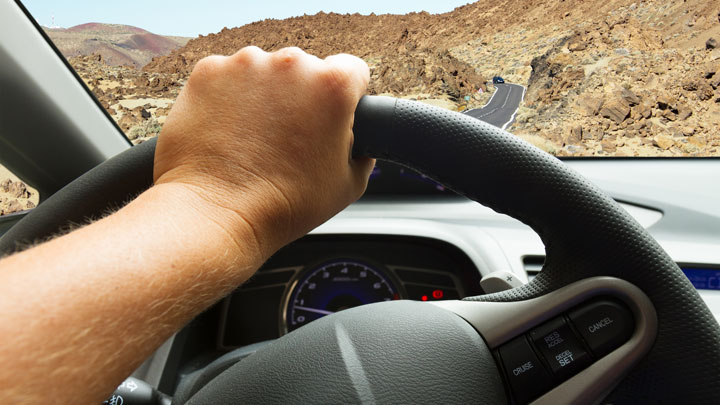
When you turn the steering wheel and hear noises such as a clicking sound or popping sound, it’s very likely you have a broken or worn CV joint. You can test this by doing the following:
- Shift the gear into reverse
- Turn the wheel all the way to one side,
- Step on the gas pedal.
You will be going in a circle, so make sure the area around you is clear. As you move backward in a circle, the popping sounds should get louder if you have a bad CV joint. You’ll either have to replace the joint or the entire shaft assembly.
Related: 3 Signs of a Sway Bar Failure
#3 – Bouncy Driving
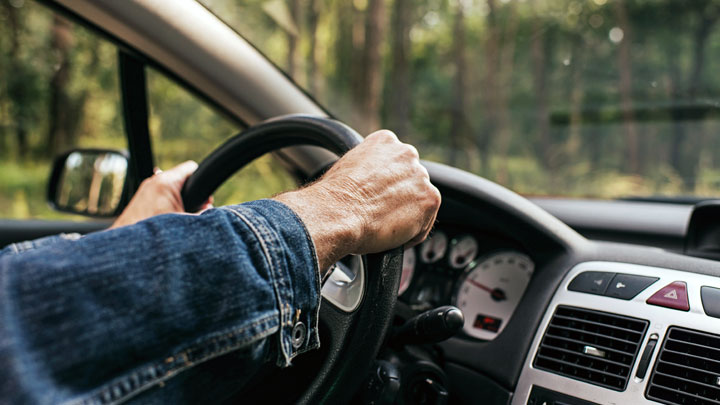
You likely have a faulty CV joint if you’re driving on a flat paved road and your vehicle is still bouncing around. You can verify this by going to an auto shop that repairs transmissions.
#4 – Vibrations
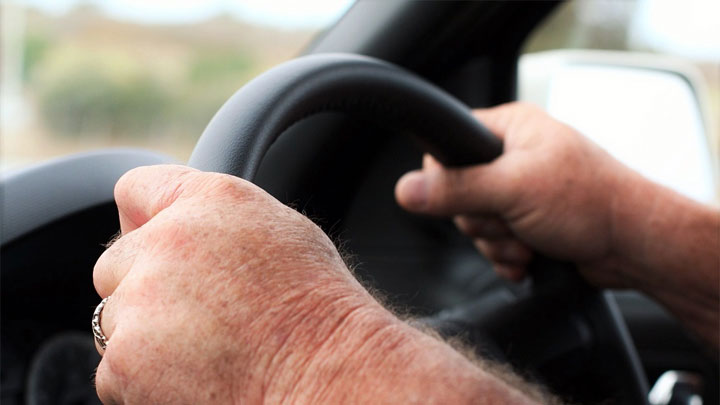
A worn or damaged CV joint will vibrate while you’re driving. CV joints in this condition will not be able to balance properly during rotation. The more you accelerate, the more intense the vibrations will become.
When vibrations become too excessive, the vehicle will become more difficult to control and your overall riding experience will be impacted. This means the drive will become less comfortable and less safe for everyone in the car. The only solution here is to replace the CV joint.
#5 – Movement Causes Knocking Sounds

A CV joint that has become worn out from being used too much will cause a knocking or clunking sound. This noise can come from the inner joint on a front-wheel drive car.
For rear-wheel drive, it can come from either the outer or inner joints. Knocking sounds can also come from the differential gears.
To perform a self-diagnosis of the joint problem, put the vehicle in reverse and accelerate, then decelerate. Alternate back and forth between acceleration and deceleration and listen for louder knocking sounds. This is proof of a bad CV joint.
Potential Causes of Faulty CV Joint
Wear and Tear
As with any part of your vehicle, CV joints are subject to wear and tear over time. This natural process can eventually lead to the problems described above, which can be more pronounced in FWD vehicles. While most people don’t hold on to a vehicle long enough for the CV joint to fail, it can happen, especially when buying a used vehicle.
Accidents and Impacts
Sometimes, accidents or severe impacts can damage your CV joint. When you drive over deep potholes (pretty much any major city has these) or get involved in a collision, the joint might get damaged. Even small ruts and potholes will over time lead to a damaged or leaking CV joint.
Lack of Lubrication
Like most components in your engine or suspension, proper lubrication is critical for CV joints to function as they should. Regular maintenance checks, including inspecting the CV joint’s protective boot for any leaks, can help you keep the joint in good working order and prolong its lifespan.
CV Joint Replacement Cost
Best places to order parts? See: 19 Best Online Auto Parts Stores
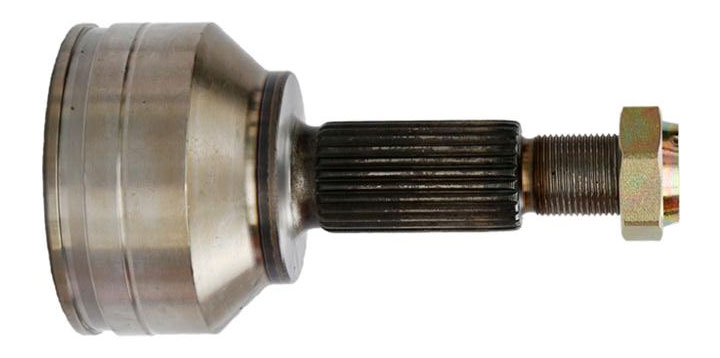
A CV joint itself will typically cost somewhere between $80 and $300 depending on the vehicle. But because it’s about a 2-3 hour job, expect labor to run about $160 to $360. This makes the total cost of CV joint replacement about $240 to $660.
The price also depends on whether you’re replacing a double or single axle. The constant-velocity joint replacement cost of a double axle will be approximately twice as expensive as a single axle.
Another factor is the make and model of your vehicle and how difficult it will be for them to perform the replacement job. Obviously, the more time they need, the higher the service cost.
Remember, this is a large service job, so your auto technician or mechanic must also conduct a general safety inspection, particularly of the boots and axles.
It’s worth noting that if only the boot cover has failed and your vehicle has under 100k miles, in may be worth it to ONLY replace the boot in some cases. But while the part itself is much cheaper, boot replacement will still take a minimum of 1-2 hours of labor.
How Long Do CV Joints Typically Last?
On average, a CV joint is made to last about 100,000 miles and failure is most often associated with boot failure which causes it to leak.
However, if the protective CV joint boot isn’t damaged, a CV joint can last a very long time, with some cars reaching over 300,000 miles on original CV joints.
What’s the Worst That Could Happen With CV Joint Failure?
As for the worst-case scenario, let’s imagine driving and suddenly experiencing CV joint failure. In this moment, the axle actually breaks. What happens? Well, you’ve suddenly got a car that isn’t going anywhere.
If this occurs while you’re driving at high speed, it can lead to a total loss of control, posing a great risk for your safety and that of others on the road.
While this is fairly uncommon and not something that should make you be scared enough to refuse driving, it makes the case for paying attention if you experience the signs and symptoms above (and take action to troubleshoot).
Can CV Joint Issues Affect the Transmission?
Definitely! A bad CV joint can impact your transmission and other components of your vehicle. When a CV joint is damaged or worn out, it can cause excessive vibrations that may lead to internal issues your transmission.
- Replace the Engine or Replace the Car? (11 Factors to Consider) - Apr 11, 2024
- Plastic Piece Dragging Under Your Car? (What It Is and What To Do) - Mar 21, 2024
- Timing Belt vs Timing Chain (What’s the Difference?) - Feb 27, 2024

My car is making popping noise when I drive 70 mph. when I slow down to sixty, it don’t make the noise no more.When I driving 65 mph it is Ok Is it possible it is CV joint?
I don’t know. Does the popping seem to speed up or slow down as your vehicle speed or engine speed changes?
Just had all my wheel bearings done because I heard a squeaking sound when I turned the vehicle. Got it back and now I’m hearing a intermittent rubbing/whining sound when I turn. The mechanic could not find anything else wrong with the vehicle?
Do you hear the rubbing only in tight turns? Sometimes a wheel and tire combination can rub on the fenders or the struts. You could have them check suspension bushings and CV joints as well while you’re in there.
I have an ’07 Hilux (same as Tacoma underneath), I recently broke a CV joint, and replaced both with new ones, but they are cheap aftermarket ones. I now have a driveline vibration at high speeds (wheels ruled out), and when I do slow full lock turns, it lurches slightly and the steering feels quite loose for a bit before it settles again.
Would this be the CV’s, or should I be looking at the steering rack? There is no clicking noise, and no grease leaking.
Check your axle nuts to make sure they were torqued correctly. A loose axle nut will feel like vague, sloppy steering and is pretty dangerous because your wheel could fly off while you’re driving.
If you end up needing to retorque the axle nuts, make sure they are properly staked as well. This prevents the nuts from backing off again in the future.
Hi
I have Ford focus,I’m experiencing a rotating knocking sounds that goes with acceleration, is like this sound is right under acceleration pedal
I’m not sure. If the knocking is coming from the engine, it could be detonation or rod knock. Could be a bad axle or CV joint, but you would probably hear that whether you’re accelerating or not. I recommend you get a diagnosis from a mechanic. If you can throw it up on a lift and take a look underneath, it may be easier to identify the issue.
2003 ford f150 5.4 – my mechanic replaced my cv axle because the boot was ripped and spraying grease when driving, now after the cv axle being replaced (front left tire), as soon as i start driving its making my truck wobble up and down from the front left corner area, pretty badly too, cant even go above parking lot speeds now.
any ideas?
I would take it back to the mechanic who replaced the CV axle and have him double check his work. The problem could be related or maybe not, I don’t know.
Hi … is CV joint axle is same for 1500 CC car 2000 Cc car .
For my 1500 Cc car Cc joint is not available but 2000 Cc car Cc joint is available
I don’t know. They are probably different, so I would double check part numbers to be sure.
I made a right turn and thr left front tire blew, and wheel seemed to kick out from the axle. I had to get a tow truck because the 2004 accord was not drivable. Does this sound like a bad cv joint!
I don’t know. How old were your tires? Was their a puncture? Can you determine why the tire blew?
i have a question i have a 2007 ford focus.i put new struts on it.it ran fine.now its making a noise on front right passanger side.like if something metal is hittin.it makes noise more and louder when its cold.im afraid the tire will come off.an it like trembles to.plz help.what can it be.i thought mayb a loose motor mount.but i dont know.help plz
Check to see if there is any abnormal wear in the front right corner, where two components may be contacting each other or rubbing. You may have to take the wheel off for the inspection. Re-torque all bolts on the new strut to make sure they are still tight.
This is a good motor column
My 2004 Blazer feels like I ran over a rock and the tire kinda feels like it slips when making a hard turn right or left. Could this be the CV joint
I don’t know. How big was the rock? Is this on the front or rear axle?
My car (fwd, standard transmission), only makes noise when I change from 1st, to reverse or in 1st when I start moving, and when I take my foot off the gas when I’m moving slow.
What kind of noise is it making?
I have a 2011 Ford Fusion. When accelerating past 65 is when it begins to shake. I have had tires changed and the entire disc breaks replaced. Also the when turning the steering wheel not always but once in a while popping/squeaking noise happens. Most of the time is when the car has been in motion for a period of time
Could be a wheel bearing or CV joint issue. It’d be best to have a shop diagnose that and replace any parts that have gone bad.
I have a Honda Ridgeline that for a few months has been ratteling on the front end when I hit the smallest bumps. Then it started making a clicking sound when turning. Last night I was driving a backroad and turned onto the highway and got up to about 10mph and heard a loud clank and then loud grinding. I could barely turn my wheel and had couldn’t accelerate. I put it in neutral and barely was able to roll out of the road. I’m almost 100% sure it was my cv axel completely breaking but my only question is that when I heard the grinding I noticed my rmp was as high as it could go. Was that from my truck trying to drive but couldn’t due to the axel breaking? I can’t remember if the rmp went down after putting it in neutral.
Yes it sounds like something in the drivetrain broke and it could have been an axle. If something that drastic went wrong, you should be able to take a peek underneath the truck and very quickly spot the problem.
Hypothetically if you have an open differential and one axle broke, that wheel won’t receive any of the torque from the differential so your vehicle would probably just sit and rev like you described.
I drive a 2017 Toyota Camry. I hear clicking noises (sort of like if there was a metal line in a bike tire hitting the spokes) when I turn the car sharp to the left or right, but it only happens when I am moving slow. Like parking, or making turn at intersection. You can only hear the clicking noise in the front tires. What could this be?
It could be the differential or CV joints. There could also be something stuck in a wheel or brake caliper that’s causing the clicking. You’ll have to probably throw the car on a lift and poke around under the nose to narrow it down.
Have a 2015 Chevy traverse with 66,xxx miles. Went to the dealership for 4 new tires, rear brakes and rotors. When I get there to pick up I was informed the front left cv joint or axle I can’t remember which is leaking and needs to be replaced .
I drive a 2011 Ford Edge FWD. clunking noise when turning left or right Ford dealership said it was right bushing and clunking still there . Took back and than they said it was front sway bar and control arms replaced and still clunking on turning. I have done some research and told them to check. CV joint and tie rods they quickly said No. it has cost me so far 1300.00 plus an alignment 384.00 because they had to drop the right strut in order to achieve the correct specs. I am stressed and concerned . Need your advice. Thanks
It sounds like they’re just throwing parts at your car instead of doing a proper diagnosis. I would find another dealership, or maybe an independent shop if you can.
When you go to the dealership, be as descriptive with the problem as possible. Say phrases like “the clunk sounds like metal on metal” and “the clunk only happens at 20 mph and when I turn the steering wheel at least a full turn”. That type of information is incredibly useful to technicians. Make sure they are able to replicate the issue before you drop the car off. Hope this helps.
Yes I just installed a 2inch leveling kit on my 2020 Tacoma with 1 inch in the rear and now I’m hearing a slight grinding sound when I’m doing around 30 miles an hour can also feel it in the gas pedal do you have any idea what it could be
I’m not sure. Double check your work to make sure you didn’t miss any bolts and torqued everything to spec. Is there any chance the grinding sound is unrelated? Perhaps some gravel stuck in a brake caliper?
If the grinding persists and you can’t find the problem yourself, I would take it to a shop just to have them check it out. That’s not the type of issue you want to mess around with.
Replaced the complete CV axle brand new from Cardone and when i put the 2006 Ford Escape in reverse a loud noise is present. If I move from reverse to drive seems ok. Almost every time reverse is when I notice the noise. Seems to go down the road ok. No clicking when turning or strait away. Just when I go into reverse…. like a lot of backlash in the joint.
I’m not sure. Could you describe the noise in detail? It’s probably best to have a technician take a look at it to see what the problem is.
Just bought a 2011 Nissan Rogue and started to notice a clunking sound when my foot is on the gas AND I am turning left or right; as if from a stop sign. The clunking sound does not happen without my foot on the gas. And the clunking sound is absent when accelerating without turning… the clunking sound happens with a jerking, almost slipping, motion. The jerking/clunking will happen once or twice right after I’ve straightened out and then goes away as I speed up.
It could be a bad CV joint, a bad transmission mount, bad motor mount, or even a sway bar bushing that’s binding.
You could try lubricating the sway bar bushings using a silicone grease or spray. When the sway bar binds in the bushing and then releases, it’ll feel like the whole end of the car is suddenly shifting over to one side. I’m suggesting this option because it is the easiest to fix and practically free if you feel comfortable crawling under the car to spray a little goop on each of the bushings.
I have a 2007 Ford Freestar.Noticed it vibrating and shaking terribly one day, next day it stopped moving. Looked under it and had grease outside of boot and tranny fluid running out the other end. Had it hauled home and the wrecker guy said it wouldn’t stay in place in park, had to chain it down more. Never did make any sounds, is that possible for a cv joint or could the transmission have an issue? My daughter had an issue with it not wanting to move at one point in the past.
I’m not sure, I suppose it could be either one. I’d take it to a shop to have it looked at. The mechanic should know pretty quickly if it’s a bad CV joint.
I have a 05 Yukon the sounds like it grinds turning left or right. I also get the grinding noise when I break sometimes and also when I turn with a bit of speed (10-12mph)?
I’m not really sure, it could be a lot of things but a grinding noise is never good. I would take it to a shop to have it inspected. It may be a brake or suspension issue.
I heard the sound even I renewed the CV joint when I check the transmission by moving the transmission it has space and sounds qaqaqaqa.why is there any thing to fill the gap or space.or to narrow.
I have a 2000 Honda passport. I don’t quite know how to explain my problem.
When I start out and I step on it. It catches like there is a brake on Then it jumps forward and the tires squeal and it lets loose It runs fine until I have to stop and step on it again. If I start out slow it almost never has that problem. People have said it might be the CV joints.
That’s strange. Does it feel like something is binding when you step on the gas? Does it feel more like stumbling, where the car suddenly has no power?
This seems like something that will be tricky to diagnose without having someone drive the vehicle to feel what you’re feeling. I think you should bring it to a shop to get it diagnosed as soon as you’re able to. It doesn’t sound like it’s safe to drive it that way.
I’ve got a 06 hummer h3 and pretty sure I’ve had bad cv axle because of the old popping and clunking noise it had it all of a sudden I made a sharp left hand turn to go up hill and no warning no nothing it stopped pulling so I had to be towed home I get it home..And on driver side the cv axle is out like 4 to 6 inches and grease and fluid leaking from it…would that top it from moving at all some plz help????
Yes, if the CV axle popped out it could cause you all sorts of problems. I wouldn’t drive it until you can get that fixed.
We have a 2005 Seibring touring that feels like driving with a flat or a wobble. I thought CV joint but I raised the car and there is no movement and no clicking noise. Any ideas to check?
If it wobbles with the tire rotation in a straight line, it’s probably something to do with the brakes or tires. Check your lug nuts to make sure they’re all tight. Make sure there’s nothing interfering with the brakes. I would take each wheel off to give everything a good shake, and to see if there’s anything caught in the wheel.
hi, i have had a cv joint on my 93 daihatsu applause replaced and now its starting to knock again, after only a couple of months
There may be another issue that is causing premature wear of the CV joint, or perhaps the replacement joints were low quality.
I’m driving a 2012 nissan almera. Recently there’s a sound coming from front wheel when acceleration come to 60 and disappeared when the speed reached 80. Pls help as the cv has been greased at inner and outer part the sound still there.
I don’t know. Make sure the wheels are balanced, check the wheel bearings, and check the tie rod ends. I recommend having the vehicle inspected by a mechanic so you know exactly what’s wrong. That’s not the kind of issue you want to mess around with.
My car only makes a knocking/wobble sound when I’m braking. It’s not my barkepads/Rutter’s because I already changed both 5 months back. It’s been doing this for a long time and has progressively gotten worse. Is this a cv joint problem?
You’d likely feel a bad CV joint whether you were braking or not.
I wouldn’t rule out brakes just yet. See if the new brake rotors show any signs of overheating. This usually looks like blue hot spots. Sometimes the metal or pad material looks smeared instead of uniform, and you may notice fine cracks in the rotors as well.
If you’re not sure if the rotors have overheated, you could try feeling each brake rotor with a gloved hand to see if one is hotter than the others after driving. Be very careful if you decide to try this, as the rotors will be really hot. You may want to start by feeling the lug nuts first; they’ll still be warm, but much cooler than the rotors themselves.
If you see any signs of overheating, you may have a seized caliper. A seized caliper won’t release completely, which causes excessive heat in the brake rotor. Brake rotors that get too hot will often warp and cause the symptoms you describe.
We have a 2011 Maserati Grand Tourismo convertible and it is making a clicking or tapping noise when we start moving or slowing down. It sounds like it is coming from the passenger rear wheel.
Check the passenger rear tire to see if there is a rock or screw lodged in it. It may help to remove the wheel from the vehicle if you are able to. That will enable you to inspect the brakes as well.
I have a proton S16 2012 model car and it has a bad vibration and humming noise what could it be?
Bad vibration could be caused by many things. Make sure your lug nuts are tight, your wheels are balanced, and your alignment is good. If the vibration persists, I would have a shop look at it to figure out what’s wrong. If the vibration is really bad, don’t drive it until you know what the problem is.
My 1997 Honda accord needs cvc joints what would an estimate for them to fix
Not sure, but I would guess somewhere in the neighborhood of $500.
Car won’t move.. accidently shifted gear to reverse and it no longer catches gears.. what needs to be replaced? Just CV axle?
Transmission
Thank u for this info! Look up my videos on YouTube all 😉 Lisa Bedrick
Thank you I am sure of my problem after checking this site. Other problem is I pressure washed undercarriage of 2004.5 dodge ram 3500 4×4 5.9 Cummins 24 valve 48re auto transmission has olly reverse and 1rst gear
Hi sorry ,so I’m having an issue my car is making a type of cracking sound when I either pull away or reverse ,or if my cars parked in a certain angle and it’s time to move.,it’s definitely coming from the front wheels .
It’s probably best that you get this checked out in person. I could take a guess, but I wouldn’t have a whole lot of confidence in my answer without hearing it in person.
Check the electrical connector at the PRND modulator on the side of the trans. Pull it apart, blow it out and dielectric it when you put it back together
would this cause a noise? we rotated the tires and after we have a wow wow wow noise that seems to come from the front drivers side
Did you get a response?
I seem to have this issue as well.
It’s only for a second and not all the time.
My brake pads on drivers side was worn unevenly , only on top part